Beatrix Potter
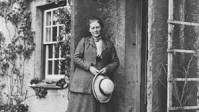
Beatrix Potter
by Ann McAllister Clark
Wouldn’t you think that it would be easy – EASY to sell Peter Rabbit to publishers? Well, before he became a household name to any little tykes between the ages of two and twelve he was not an easy sell.
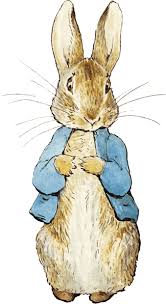
Not until Beatrix Potter, the author and artist who created Peter and all his cohorts was into her thirties did she even think of publishing a book. All her drawings were collected and stored away only hopping out to pretty up a note to a nephew or a young friend who she thought needed cheering up. With a little encouragement she finally gathered enough of her artwork to approach publishers with an idea of writing a ‘tale’ for little children. And can you believe it? She could not find anyone, not one publisher to print her work. She had studied biology, anatomy and art all her life. She created little characters that charmed her young friends and family but she could not charm publishers enough to take a chance on her and Peter Rabbit. So she did what so many other frustrated writers did. She published the book herself. On a cold December day in 1901 Beatrix Potter had two hundred and fifty copies printed. She promptly gave most of the books away. Now that the little rabbit was in book form it wasn’t long before a company in London, Frederick Warne and Company did take notice.

Norman Warne, the youngest of the three Warne brothers in the company dealt most frequently with Miss Potter. She trusted him and to him she took all her ideas and drawings. He was treated to her proofs before anyone else viewed them. He made sure that her ideas and creations were carried out to her exact directions. He was the person with whom she discussed her contracts. And he was the one that finally persuaded the Warne firm to publish an edition that was colorized. That edition was The Tale of Peter Rabbit. At publishing time, October 2, 1902, there were eight thousand copies that promptly sold out.
Not completely trusting the Warne publishing firm’s leader, Fredrick Warne, Beatrix decided to publish her second book herself. She wanted her pictures to be accompanied by many of the rhymes she loved so much. She thought he might cut these and put words to the pictures himself. With the money she had earned with The Tale of Peter Rabbit, she published five hundred copies of The Tailor of Glouster. 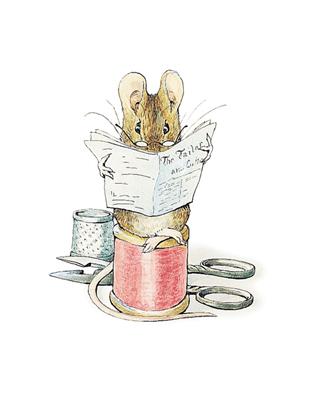 She distributed these herself and sent one copy to Norman Warne. Finally, the Warne company saw her vision and published The Tailor of Glouester in time for Christmas, 1903. Two months later a third title was published, The Tale of Squirrel Nutkin. As their relationship developed, Beatrix and Norman found themselves admiring eachother and seeking out eachother’s company. The couple soon fell in love and 1905 became engaged. But love was not to stay in Beatrix’s life for long. Several months after they became engaged, Norman died suddenly.
She distributed these herself and sent one copy to Norman Warne. Finally, the Warne company saw her vision and published The Tailor of Glouester in time for Christmas, 1903. Two months later a third title was published, The Tale of Squirrel Nutkin. As their relationship developed, Beatrix and Norman found themselves admiring eachother and seeking out eachother’s company. The couple soon fell in love and 1905 became engaged. But love was not to stay in Beatrix’s life for long. Several months after they became engaged, Norman died suddenly.
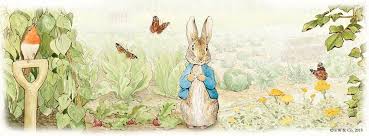
Beatrix used her earnings from the ‘little books’ to leave her over powering parents and and unhappy loss to purchase a small farm, Hill Top in the northwest area of England. 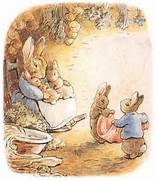 Her love of sheep and breeding filled her life with farming. She again found love in her solicitor, William Heelis who shared her love of the Hill Top farm and farming. They would enjoy a long and happy thirty years of marriage.
Her love of sheep and breeding filled her life with farming. She again found love in her solicitor, William Heelis who shared her love of the Hill Top farm and farming. They would enjoy a long and happy thirty years of marriage.
When Beatrix Potter moved to the country and began farming she painted exquisite watercolors for her books. Most of these books depict the surrounding north-country farming life. But by the age of fifty-six Potter’s creative period was nearly over and she devoted her time to sheep farming. Over the years she became well known as a breeder of Herdwick sheep. She purchased several more farms over the years until at the time of her death on December 22, 1943 she was a substantial landowner.
Sister Anne was the last of Potter’s books to be printed during her lifetime. Two more titles, Wag-by Wag and The Tale of the Faithful Dove were printed posthumously.

In their resource guide on Beatrix Potter, Sayre G. Turney, Michelle Frisque, Beth Kean and Elizabeth T. Mahoney explore the life and publishing career of Miss Potter. Their site can be found at: http://yorktown.library.pitt.edu/libraries/is/enroom/illustrators/potter.htm It is a through site with color pictures, bibliography, biography, works by Miss Potter and examples of her journal.





